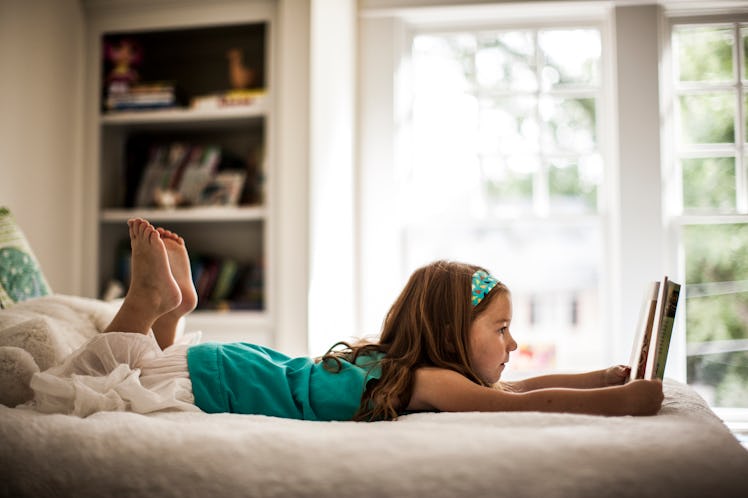At What Age Can A Child Stay Home Alone? And For How Long?
How long babies, toddlers, preschoolers, tweens, and teens can be left alone depends on variables like temperament and distance.

Parenting requires years of constant, round-the-clock caretaking. Desiring alone time is natural, but it’s not like you can lock a child in their room. So it’s no wonder parents start wondering at what age can kids stay home alone. But understanding when a child can be left at home alone and for how long depends on several important factors — because, and it’s not just a cliché, each child is unique.
Truth be told, there’s no hard-and-fast rule, law, or definitive age when children can be left alone. But alone time can and should be utilized, in certain doses, at all ages. Just how far parents can go and how long kids can be left alone depends on the age and unique needs of your child.
Give Babies Space, But Don’t Leave Them Home Alone
The amount of time babies can be left alone in a secure, safe area, has less to do with the actual duration and more to do with a baby’s temperament. A child with a cautious temperament may need parents to stick closer to them than an adventurous baby might.
“Most parents have baby monitors. They can see everything their baby does on their phone or at least hear them on a monitor,” says Tasha Howe, Pd.D., assistant professor of psychology at Humboldt State University in California. “Babies can be left alone to nap, especially if they are on a firm mattress with no fluffy blankets or pillows, with snug clothing, as recommended to prevent SIDS.”
She suggests a structured schedule that cycles through feeding, nap, and play at specific times, which can help babies regulate their circadian rhythms and predict what’s coming.
Of course, leaving a baby home alone is not advised.
“Some babies are happy cooing in a crib for a couple of hours, others not even for five minutes. But it isn’t harmful to leave a baby for 30 minutes while you cook or read a book,” Howe notes. “Their limbs need to move and they need face-to-face contact for proper brain development, so they should have plenty of face time, but also some downtime to prevent overstimulation.”
Toddlers Can’t Be Left Home Alone, But They Can Roam
Once a child reaches toddler and preschool age, parents should feel comfortable letting children roam the house and yard alone (provided it’s all been childproofed) for as long as they like. Kids should be encouraged to explore on their own as discovery begins.
“Their main job in life is discovery and hypothesis-testing: ‘What would happen if I climbed here, opened this, or pulled on this?’” says Howe. “So they should be able to roam around the house and forbidden rooms should have closed doors with childproof knobs. If you have a small yard where they can’t get hurt or wander off, they can be out there alone, but you should always be able to see and/or hear them.”
To that point, the definition of “alone” for a child under 7 should absolutely include the parent being physically near a child and within earshot. Leaving a calm baby or an exploratory toddler alone in a childproofed room is completely fine for whatever interval the child is content, but the second commotion or trouble can be detected, parents need to be ready to spring into action.
Middle and Elementary Schoolers: Sometimes Home Alone
The age a child can a child stay home alone more literal sense is not until the late elementary or middle school years. And even then, a massive number of factors — geography, maturity, etc. — dictate whether and for how long alone time should be exercised.
“In general, most children can be left alone for an hour or so between 8 and 10 years of age. If an 8-year-old must be home after school alone, it’s best to have them call to check-in, and have a structured schedule set for homework, chores, TV, etc. until parents get home,” says Howe. “It depends on the age and the temperament of the child. Some kids are content playing alone and are very mature or responsible. Others can’t be trusted. Also, each state has specific laws about the age when a child can be left alone.”
How Long Can Tweens and Teens Be Left Home Alone? It Depends
As for whether tweens and teens have reached the age can kids stay home alone, the term “no two kids are the same” is taken to the extreme. For parents, it all boils down to trust, trial, and error.
“If they’ve given you no reason to worry, start by trusting them until they prove you shouldn’t. Privileges should be earned by responsible behavior,” says Howe. “Most tweens can walk around the mall with their friends for an hour or so while the parents walk in other areas of the mall. They usually do okay by being dropped off and picked up from the movies.”
Howe stresses that leaving tweens and teens home alone should be paired with structure in order to keep them in line rather than just letting them roam wild.
“Tweens and teens also need structured time to keep them out of trouble, but they also need downtime to just relax and hang out,” she says. “I typically let my 15-year-old make his own choices after school as long as he reports in hourly or so with where he is going and who he is with. When he ends up somewhere he didn’t tell me he’d be, he loses his city-wandering privileges for a while. Natural consequences teach them to use their freedom responsibly.”
This article was originally published on